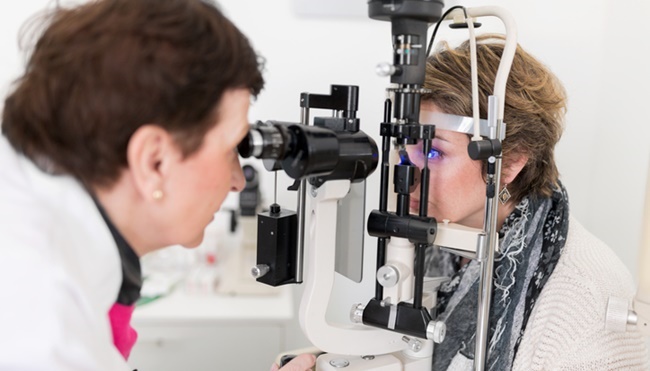People with type 1 diabetes face the risk of developing diseases that can affect major organs in the body, including the kidneys, blood vessels, heart, and the eyes. Eye problems can lead to blindness – therefore treatment guidelines have long called for annual eye exams.
But new research suggests this one-size-fits-all advice is costly and ineffective, because people with a low risk may need less-frequent screenings while people at high risk may need to be seen more often.
Some people are more at risk than others
Diabetic retinopathy can damage the light-sensitive tissue at the back of the eye and trigger full vision loss, the researchers explained. Screening can catch this disease before irreparable damage is done, but not every person with diabetes faces the same risk.
"For example, patients with no or minimal eye changes and good blood sugar levels might not need their next examination for another four years," said study author Dr David Nathan.
"On the other hand, if the patient already has developing eye disease and their blood sugar control has not been in the recommended range, they might need a repeat examination in as soon as three months," he added.
Nathan is the director of the Diabetes Center and Clinical Research Center at Massachusetts General Hospital, in Boston.
Diabetic retinopathy is the leading cause of blindness in Americans aged 20 to 64, according to a Health24 article.
Screening study suggests
Current guidelines suggest getting an annual eye screening within three to five years of a type 1 diabetes diagnosis. People with type 1 diabetes cannot produce any insulin.
Diabetic retinal screening is done on an ad hoc and opportunistic basis by a spectrum of healthcare providers in South Africa. A study published in The South African Medical Journal estimates that raising the current screening expertise and exploiting the available technology has the potential for significant health gains in the future.
To assess that advice, the investigators focused on type 1 diabetics (aged 13 to 39) who had enrolled in a large, national diabetes trial between 1983 and 1989.
The latest analysis involved 24 000 eye exams conducted over 30 years among roughly 1 400 people with type 1 diabetes.
Retinal photographs were taken every six months until 1993, and then – in a follow-up study – once every four years until 2012. The study participants' vision, advanced retinopathy status and general diabetes history were tracked for an average of nearly 29 years.
Findings
The researchers determined that those participants who had an average blood sugar level of 6%, but no signs of retinopathy, could forgo the annual screening in favour of just one exam every four years. Similar people with mild retinopathy should be screened once every three years, the team concluded.
By contrast, those with severe or moderate retinopathy would do well to get screened every three to six months, respectively, the study authors reported.
People with higher blood sugar levels (8 to 10%) might also need to be screened more often, the researchers cautioned.
On average, the new recommendations for people with type 1 diabetes would likely cut the need for eye exams in half over a two-decade period. That would translate into an overall savings of $1 billion (R13.2 billion), while ensuring that those facing the highest risk got more timely treatment, the researchers said.
The findings were published in the New England Journal of Medicine.
iStock
Nathan described the results as "definitive". However, he said the jury is still out as to "whether the individualised frequency of eye examinations will be implemented by physicians" and followed by people with type 1 diabetes.
"The risk is that physicians may find it easier to schedule an annual eye examination compared with the new individualised schedule, which may be more difficult for physicians and patients to remember," he acknowledged.
"However, most physicians and ophthalmology offices use computer programmes – including reminder programmes – for scheduling, so we think that this potential barrier should not be a substantial obstacle," Nathan added.
Courtney Cochran, senior manager of media relations for the American Diabetes Association (ADA), noted that the ADA issued updated guidelines for retinopathy screenings in February.
The new recommendations now state that people with type 1 diabetes should start annual screenings within five years of their diabetes diagnosis. But those who remain free of retinopathy for a year or two may "consider" the option of less-frequent exams.
Annual screenings are mandatory
However, the ADA also said that if and when "any level" of retinopathy is detected, annual screenings are a must, while those with progressing retinopathy will require even more frequent screenings.
Dr Jamie Rosenberg, who wrote an editorial that accompanied the study, suggested the new recommendations reflect "a trend toward reducing unnecessary screening for eye diseases".
"The upside to this new screening protocol would be significant money saved for the health care system, in addition to time saved for both patients and doctors," said Rosenberg, who is an associate professor of clinical ophthalmology and visual sciences at the Albert Einstein College of Medicine, in New York City.
Individualised schedules will make tracking patients more difficult, Rosenberg agreed. But, "this new screening protocol has great potential if adherence to the examination schedule could be assured."
Read more:
Blood sugar monitors helpful for type 1 diabetics




 Publications
Publications
 Partners
Partners
















